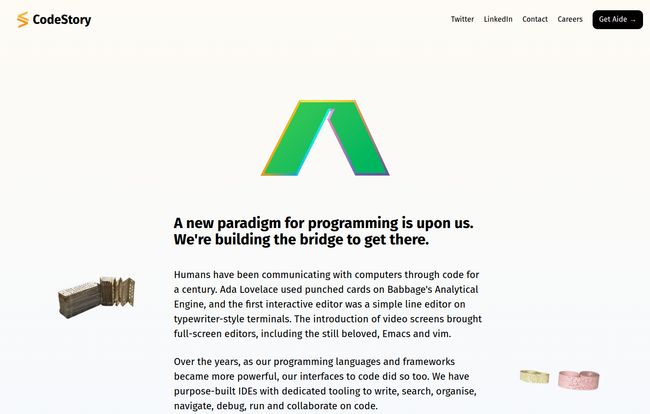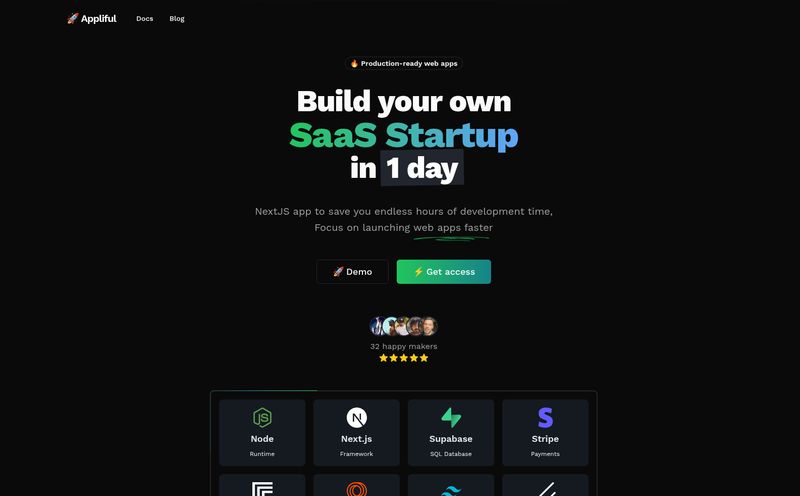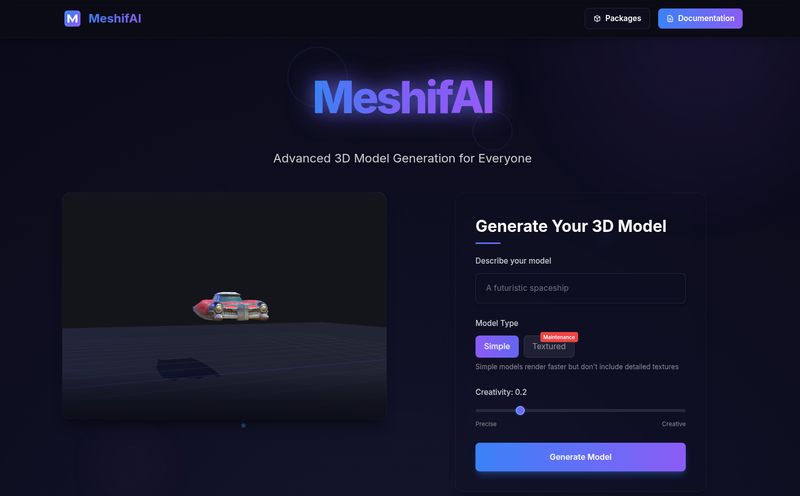How much of your week is spent not on creating brilliant new features, but on hunting down some obscure, soul-crushing bug? You know the one. The one that only appears on a Tuesday when the moon is in retrograde and you’ve just had your morning coffee. For me, it's probably more time than I'd care to admit. It’s the necessary evil of our craft, the digital equivalent of weeding a garden so the cool stuff can grow.
For years, we've had linters, debuggers, and static analysis tools. They help, sure. They're like a metal detector for finding landmines. But you still have to do the digging. What if you had a partner? Not just a suggestion engine like Copilot, but something that could act like a seasoned code archeologist, dig into the foundations of your codebase, find the cracked foundation, and then… just fix it?
That’s the bold promise of a new tool that’s been pinging on my radar: CodeStory. And frankly, their whole approach feels a little different.
So What Exactly is CodeStory? A New Partner in Crime?
At its core, CodeStory is an AI-powered mod for VSCode. Simple enough. But that description doesn't really do it justice. The team behind it, a seriously impressive-looking group of four based out of London (we're talking ex-Meta, government project leads, ACM ICPC finalists), aren't just building another extension. They talk about creating a “new paradigm for programming.”
They see a future where the code editor isn’t just a workspace for a human, but a collaborative environment for a human and an AI to work together. Their bigger project is called Aide, an AI-native editor built from the ground up for this purpose. CodeStory seems to be their first major foray, a way to bring that power into the VSCode ecosystem most of us already live and breathe in.

Visit CodeStory
Think of it like this: for a century, from punched cards to slick IDEs, we've been the only ones talking to the machine. CodeStory wants to give the AI a seat at the keyboard, turning monologue into a dialogue. Its job isn't to just autocomplete your thoughts, but to perform the heavy lifting of diagnostics and repair, freeing you up for the bigger picture stuff.
How CodeStory Aims to Change the Daily Grind
Okay, lofty mission statements are great. But what does it actually do? As a professional who lives and dies by traffic, conversions, and clean code, I care about the practical application. How does this make my life, and my team’s life, easier? From what I've gathered, it boils down to a few game-changing capabilities.
Automated Bug Squashing from Root to Resolution
This is the headline feature. CodeStory doesn’t just spot a `TypeError`. It’s designed to scan your entire codebase to understand the context, trace the bug back to its true origin point—its root cause—and then propose the actual code to fix it. This is a far cry from just getting a red squiggly line and a cryptic error message. It's like having a senior dev on call 24/7 who has already read all your project documentation. The potential time savings here are… staggering to think about.
Auto-Generated Tests That Inspire Confidence
Here’s the part that really got my attention. After fixing the bug, CodeStory automatically generates tests to prove the fix works and, crucially, that it hasn’t broken anything else. Anyone who has pushed a “simple fix” at 5 PM on a Friday only to break three other things knows the sheer terror of that moment. Automating the verification step isn't just a productivity boost; it's a foundational improvement to code quality. It’s like having an incredibly diligent, and slightly paranoid, QA engineer built right into your editor. I love that.
A Glimpse into Real AI-Human Collaboration
This is less a feature and more of a philosophical shift. By integrating with their Aide editor concept, CodeStory is paving the way for a different kind of programming. It's not about the AI replacing you. It’s about augmenting you. You're the architect, and the AI is your super-powered construction crew, handling the tedious, back-breaking work of debugging and testing so you can focus on designing a better building.
My Honest Take: The Good, The Bad, and The... Complicated
No tool is a silver bullet. As someone who's seen countless 'next big things' in the SEO and dev worlds, I’ve developed a healthy dose of skepticism. So let's break it down.
The upside is obvious and incredibly appealing. The promise of automating the most frustrating part of a developer's job—the bug hunt—is massive. This translates directly to enhanced developer productivity, faster release cycles, and frankly, happier developers. A less-frustrated developer is a more creative and effective developer, period. Plus, the built-in test generation could be a godsend for teams trying to improve their code hygiene and reduce technical debt.
However, let's ground ourselves. The effectiveness of a tool like this is going to be heavily dependent on the codebase it's pointed at. If you’re working with a decade-old monolith held together by digital duct tape and hope, even a genius AI might throw up its virtual hands. There’s also likely an initial setup and a learning curve. You have to learn to trust the tool, to understand its suggestions, and to know when to intervene. It’s a new skill, and it won't be an overnight transition for everyone. Some might argue that over-reliance on such tools could stunt the growth of junior developers who need to learn the gritty details of debugging the hard way. Its a valid point, I think.
What’s the Damage? A Look at Pricing
Here’s the million-dollar question: how much does it cost? Well, for now, that's a bit of a mystery. Their website is focused on the vision and getting people on board with Aide. The pricing page itself currently leads to a 404 error, which tells me they are probably still in a private beta or early-access phase, figuring out the right model.
If I had to guess, I'd expect a SaaS model, likely a per-user/per-month subscription, possibly with a free tier for individual developers or open-source projects. That seems to be the standard playbook for dev tools these days. I've bookmarked the page and will definitely update this article the second I see any public pricing information.
So, Who is CodeStory Actually For?
I see a few groups getting really excited about this.
- Small Teams and Startups: Where every developer wears multiple hats, offloading the bug-fixing burden could be a massive force multiplier.
- Enterprise Teams: For large organizations looking to enforce coding standards and accelerate debugging across complex, sprawling applications.
- The Curious Technologist: Any dev who is genuinely interested in the future of AI in software development and wants to be on the cutting edge.
It might be less suited for absolute beginners who still need to build that fundamental debugging muscle memory. You have to learn the rules before you can effectively use tools that help you break them.
Wrapping It Up: Your New AI Teammate?
CodeStory is more than just an intriguing VSCode extension. It represents a genuine attempt to answer the question, “What does programming look like in the age of AI?” It's not about replacing humans but about elevating them. It’s about building a bridge, as they say, to a future where we can focus more on creation and less on correction.
While there are practical questions to be answered about its real-world performance and pricing, the vision is compelling. I, for one, am tired of weeding the garden. I’m ready for an AI assistant to handle the pests so I can get back to planting. I’ll be keeping a very close eye on this one.
Frequently Asked Questions
What is CodeStory in simple terms?
CodeStory is an AI tool for the VSCode editor that automatically finds the root cause of bugs in your code, fixes them, and then writes tests to make sure the fix is solid.
How is this different from GitHub Copilot?
Think of it this way: Copilot is an AI co-pilot that suggests code as you type. CodeStory is more like an AI mechanic that diagnoses a problem with the whole engine, finds the faulty part, and repairs it for you after the fact.
Is CodeStory difficult to use?
There may be a bit of a learning curve, as with any new powerful tool. It involves not just installing it but learning how to collaborate with its suggestions and trust its fixes. The initial setup might also require some configuration.
Does CodeStory work with languages like Python, JavaScript, or Java?
The documentation isn't explicit yet, but given its modern architecture, it's highly likely to support most major programming languages. For specific compatibility, it's best to check their official resources once they are more widely available.
Is CodeStory free to use?
Currently, there is no public pricing information available. They are likely in an early access or beta phase. Most professional developer tools of this nature eventually adopt a subscription model.
Who is the team behind CodeStory and Aide?
They are a team of four based in London, UK, with a strong background in tech, including experience at major companies like Meta, working on government-level infrastructure, and competing in prestigious programming competitions like the ACM ICPC.
Reference and Sources
For more information and to follow the project's development, you can visit the official website:



